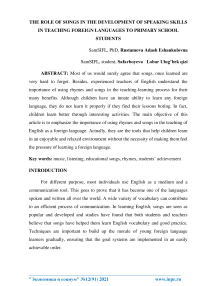The role of songs in the development of speaking skills in teaching foreign languages to primary school students
Автор: Rustamova A.E., Safarboyeva L.U.
Журнал: Экономика и социум @ekonomika-socium
Рубрика: Основной раздел
Статья в выпуске: 12-1 (91), 2021 года.
Бесплатный доступ
Most of us would surely agree that songs, once learned are very hard to forget. Besides, experienced teachers of English understand the importance of using rhymes and songs in the teaching-learning process for their many benefits. Although children have an innate ability to learn any foreign language, they do not learn it properly if they find their lessons boring. In fact, children learn better through interesting activities. The main objective of this article is to emphasize the importance of using rhymes and songs in the teaching of English as a foreign language. Actually, they are the tools that help children learn in an enjoyable and relaxed environment without the necessity of making them feel the pressure of learning a foreign language.
Music, listening, educational songs, rhymes, students’ achievement
Короткий адрес: https://sciup.org/140289026
IDR: 140289026
Текст научной статьи The role of songs in the development of speaking skills in teaching foreign languages to primary school students
For different purpose, most individuals use English as a medium and a communication tool. This goes to prove that it has become one of the languages spoken and written all over the world. A wide variety of vocabulary can contribute to an efficient process of communication. In learning English, songs are seen as popular and developed and studies have found that both students and teachers believe that songs have helped them learn English vocabulary and good practice. Techniques are important to build up the morale of young foreign language learners gradually, ensuring that the goal systems are implemented in an easily achievable order.
Music and songs are important parts of learning. Children enjoy music and teachers use songs inherently in a fun way to teach them concepts and language. The most significant trait of songs, though, is repetition. They have language patterns, but they also improve listening ability, rhythm and pronunciation and provide a fun atmosphere. In fact, songs and rhymes are very beneficial. There are so many facets of a language with the use of songs that can be delivered and recycled. Particularly at pre-school and lower primary levels, teaching English using songs has been a common practice in schools. Recent studies have shown that songs are one of the sources of most successful acquisitions of child language, showing that lexical objects must be repeated several times before children internalize them. By songs the people will feel happy even it is supposed to be the compensation to eliminate bored or stress. Music and song also are able to indentify someone’s character or behavior. Based on this, song can be made use of as a media of teaching in the process of teaching and learning English at school to increase more the students’ interest in learning especially in learning foreign language. Teachers in learning used songs must give more attention to their students and teachers can able to guide their students was sung. By using songs a teacher teaches about music, intonation, pronunciation, and a teacher can give a brief and translate even if their initial understanding of the vocabulary is poor.
Список литературы The role of songs in the development of speaking skills in teaching foreign languages to primary school students
- Millington N.T. (2011). Using songs effectively to teach English to young learners. Language Educational in Asia, 2(1).
- Murphey T (1992a). the discourse of pop songs. TESOL Quarterly, 26.
- Murphey T. (1992b). Music and Song. Oxford University Press.


